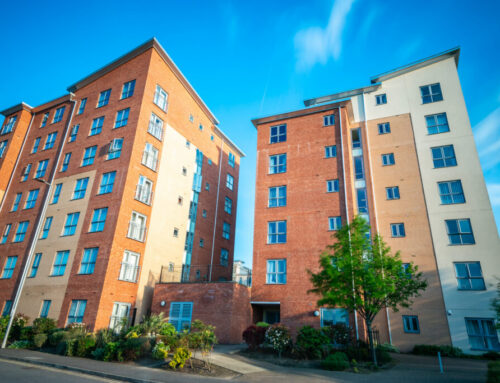Having noisy neighbours can be a nuisance at the best of times. Even worse, it can sometimes be very difficult to manage the situation in a constructive and friendly way. Belinda Thorpe, Managing Director of Residentsline, discusses the best way forward when faced with noise from next door.
Oftentimes, the most common complaints from residents of blocks of flats are about excessive noise. These issues are usually due to a number of things, from DIY work or building activity to late night music, laminated floors and barking dogs.
Some important things to remember:
- The Government advises residents to solve their noise problems by taking a stepped approach.
- What your landlord or agent can do to prevent noise will be limited. It is unlikely that a court will evict a long leaseholder for noise problems.
- There are helplines and information leaflets available to assist you.
What can Lessees do?
Use the following stepped approach:
- Keep records
- Start building a relationship with your neighbour.
- Have a quiet word about the problem.
- Have a stronger word: explain the impact on you and/or your family.
- Employ mediation services.
- Contact your local authority.
- Contact abatement societies.
- Take legal action yourself.
Keeping Records of Noise
Keep a record of the nuisance as soon as it happens e.g. date, time, type etc. It is not a legal requirement, but you may need it to back up your complaint and it could be used in evidence if you go to court.
Approach Your Neighbours
If you do approach them, wait until a suitable time and, although you may feel angry, do not lose your temper. It could be used against you at another time. Plan what you are going to say and keep calm.
Before you approach your neighbour, it is important to assess the risk to your personal safety and property. If you feel frightened or intimidated by your neighbour and you are worried that they may respond aggressively, then approaching them to complain may not be the best option for you; you may wish to consider contacting the police in these circumstances. Most problems, however, can be solved amicably without any need for further action. You may feel anxious about approaching your neighbour but remember that they may be genuinely unaware that they are the source of a problem. When approached, often they will be embarrassed about the nuisance they have been causing and will be far more considerate in future. It is important to do this as early as possible before the problem spirals out of control.
Mediation Services
Neighbour mediation is a process in which a third party helps people resolve disputes between those who live in the same locality or neighbourhood. It is a route that aims to assist both parties in identifying each other’s needs, sorting out any problems, exploring solutions and negotiating an agreement. This often helps preserve neighbourly relations or build better ones and can sort out disputes before they escalate. Most mediation services are registered charities although some are part of other organisations such as local authority housing mediation services departments or the local Citizens’ Advice.
Contacting your Local Authority
Your local authority has a statutory duty to take reasonable steps to investigate complaints. Under Section 80 of the Environmental Protection Act 1990, the Environmental Health Officer (EHO) is required to take “all reasonable” steps to assess whether the noise constitutes a statutory nuisance. If the EHO is satisfied that a statutory nuisance exists, or is likely to occur or reoccur, they must serve a noise abatement notice. However, they may suggest other ways forward:
- Mediation: Many local authorities have independent trained mediators who will offer to mediate between you and your neighbour. Sometimes, this may work, but other times it may not be appropriate.
- A warning letter: Some local authorities may send a warning letter. Again, this may work, but it can backfire. It can alert the neighbours that you have complained and therefore the noise may become more intermittent and collecting evidence may be a problem.
- An abatement order: Ultimately, if the noise persists and the local authority has deemed the noise a statutory nuisance, they have a duty to serve a notice on the offenders. If the offender fails to comply, they can face court action. The local authority also has the power to confiscate noise producing equipment.
Taking Legal Action Yourself
If for whatever reasons the local authority does not act, or if you do not wish to involve them, you can complain about a noise problem direct to a magistrates’ court. The magistrates’ court will need to be persuaded that the noise problem amounts to a statutory nuisance. It is important that you keep a written record of the dates, times and duration of the noise as well as a description of its nature and the distress it causes you.
Before you complain to a magistrates’ court you should seek some good advice from Citizens’ Advice, a solicitor, or the clerk at the local courts. There is no legal aid for such cases.
Late Night Music and Parties
Some local authorities now have emergency response teams to deal with urgent noise problems. They can issue warnings, seize equipment and issue fixed penalty notices of £100 (Noise Act 1996).
Barking Dogs
Incessant barking may be classed as a statutory nuisance and so can be reported to the local authority.
Local authorities have the power to gain entry to premises to stop noise which can be used to stop misfiring alarms. The Noise and Statutory Nuisance Act 1993 gives local authorities power to disconnect burglar and car alarms.
What can you expect from your Landlord or Agent?
Many lessees believe that agents have a big stick to wave at noise nuisance in blocks of flats. However, this is not the case. Most leases will contain covenants which say leaseholders shall not cause nuisance and annoyance to neighbours. There may be more specific restrictions such as no loud music between, for example, 11pm and 7.30am or that floors should be carpeted. These clauses are all well and good, but in practice they are difficult to enforce for several reasons. The meaning of the covenant should be clear before considering enforcement. Any benefit of the doubt over the meaning will always be given to the lessee. The lease may not contain a clause that requires the landlord to enforce the covenants; if it does not then there is no obligation on the landlord to take any action. Even if the lease does contain a clause requiring the landlord to enforce the covenants against other lessees (a mutual enforceability covenant) there is usually a catch; the catch is that the complainant leaseholder suffering the noise will have to pay the landlord’s costs of enforcing the covenant.
So, how does the landlord enforce a covenant against noise or one that requires, for example, carpets instead of laminated floors? A reminder letter to the offending lessee may work. If it does not, then the legal remedies open to the landlord are an injunction or forfeiture. Injunctions are costly but can be applied for with or without forfeiture. Also, the aggrieved lessee can apply for an injunction and may well be more successful if he/she does. Forfeiture is not an easy route for landlords and can be extremely costly; neither will it produce quick results. However, the threat of forfeiture may well produce a response and solve issues such as the lack of carpets in a flat where the covenants require them and use of forfeiture may be the most effective way to further prevent the use of laminated floors spreading in a block.
For all the above reasons, the more practical route for a managing agent, faced with distressed lessees complaining about noise from neighbours, is to offer advice on how they can take better and cheaper action themselves as set out in the stepped approach above.




Leave A Comment